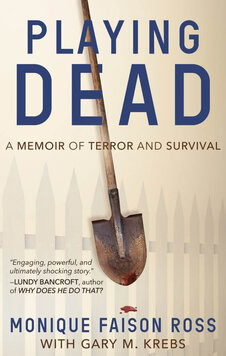
Winner of multiple literary awards!
Monique, the daughter of San Diego Charger’s football great Earl Faison, married her high school sweetheart soon after she discovered she was pregnant with his child. Her relationship with Chris was shaky from the start, but turned tumultuous as he became verbally and physically abusive. When she could no longer put up with the abuse, she left him with their children. That was when the stalking and genuine threats began. Nothing stopped him—not protection injunctions, police warnings, or even arrests. One fateful Monday morning, Chris kidnapped Monique in front of her children and drove off on a nightmarish car ride that involved car crashes and rape. He mercilessly beat her on the head with a shovel and abandoned her brutalized body in the woods in the rain. He left, presuming she was dead…but was she?

Finalist in Non-Fiction Memoir
Won Outstanding Non-Fiction, Social Issues
"Monique Faison Ross shares with us her engaging, powerful, and ultimately shocking story of brutal intimate violence. Her survival, her strength, and her wisdom are an inspiration and a lesson to us all. This is a not-to-be-missed opportunity to hear what the targets of domestic violence are trying to tell us, told in a way that will keep you turning the pages." -- Lundy Bancroft, author of Why Does He Do That? and The Joyous Recovery
From The Book:
While Chris pulled over to change one of the tires, torrential
rain started to come down. The windows became fogged from the moisture and my
panicked breathing.
After turning off the car engine, he produced a roll of duct tape
that had been concealed somewhere on his body and tore off a piece with his
teeth. It became clear to me that he had planned for some, if not all, of this.
“Please don’t do that,” I protested. “I won’t be able to breathe.”
Chris knew from our years together that I had something of an
issue with breathing through my nose. Shockingly, for the moment, at least, he
still seemed to care about my well-being.
“Okay, I won’t,” he conceded. “But you better be quiet while I
change the tire. I just need a little cooperation. All I want to do is talk
with you.”
I nodded to indicate that I intended “to cooperate.” He stretched
out the duct tape, wrapping it around both of my wrists several times and
fastening them to the center gearshift.
He stepped outside in the rain to tend to the flat tire. I watched
him circle to my side of the car with a tire iron when someone pulled up beside
us in a black, pickup truck. From the driver’s seat, the man called out to
Chris through his passenger window and across our car.
Tightening his grip on the tire iron, he shot a glance at me: Do not say a word or else. I had no
doubt he would kill me—and possibly the Samaritan in the truck—if I were to
scream out.
“Need any help?”
“Nope, we’re all good.”
As Chris spoke, I angled my head, so the truck driver would make eye contact with me and read my predicament without my having to say anything. I wasn’t sure what he could discern on my face from such a distance—and through the rain, no less. But I had to try.
“Are you sure?” the truck driver asked.
“Yup, all good. Thanks.”
The two exchanged waves before rolling up their windows. The truck driver moved on, not having noticed anything out of the ordinary.
"Playing Dead is a compelling book—a true page-turner. Smart, strong, and protective of her children, Monique was barraged with snide comments and criticism, yet had no idea that this was verbal abuse and never suspected its extreme escalation. Every chapter compels the reader forward to what's next." —Patricia Evans, author of The Verbally Abusive Relationship, Controlling People, and more. www.VerbalAbuse.com



Monique’s memoir is a riveting first hand story of survival through a horrific experience. Her total awareness of “is this really happening to me?” is a stark reminder that domestic violence starts innocently enough and hints of violence cannot and should not be dismissed.